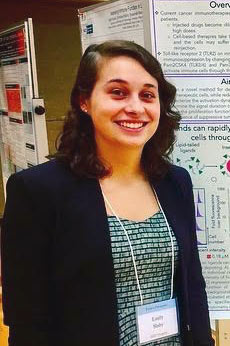Chemical Engineering

Who is your mentor for your research project?
Professor Gregory Szeto, Department of Chemical, Biochemical, and Environmental Engineering
How did you arrange to work with this person?
I was emailing a few professors in my department about lab positions and I included my enthusiasm about cancer research when one of them connected me to Dr. Szeto. I contacted Dr. Szeto with my resume and answered a few questions about my interests and goals. The lab had just opened in January 2016, so I helped with the startup and started learning about immunology.
How did you know this was the project you wanted to do?
I studied the relationship between stem cells, cancer, and aging during an English research paper my first year of community college. Cancer research interested me because of the complexity of the disease, and this was a wonderful opportunity to build my skills and apply myself. I have learned so much about cancer stages, therapies, and immunology through this project.
Do you get course credit for this work?
I currently get course credit as an elective for my chemical engineering bachelor’s degree. A comprehensive report is required to compile results and relate the research back to chemical engineering cores. This helps me apply concepts learned in classes to research applications.
How much time do you put into it?
During the semester, I put in about 15-20 hours of lab and outside research time. This time may be spent performing experiments, analyzing results, or making presentations to explain results. During the summer, I have much more time to explore my project and try new things, so I am usually there about 40 hours per week.
How did you hear about the Undergraduate Research Award (URA) program?
My mentor encouraged a few of my lab members to apply to help us explain our projects and get ready to present at the Undergraduate Research and Creative Achievement Day. It really helped me understand the background and explain my project better to lab members who did not do similar work.
Was the application difficult to do?
The application was not difficult with the support of my lab members. I learned how to explain my project, so other people could understand my results and next steps of research. It took work to make the project clear to others, but it was a great skill to practice and it continues to help me today with future presentations.
How much did your mentor help you with the application?
My mentor was very helpful with providing constructive criticism so other professors would understand my project, as well as suggesting grant proposals to read that ask similar questions. This application was like a grant proposal without preliminary results.
What has been the hardest part about your research?
The hardest part of the research is troubleshooting after analyzing the results. This is also what makes research fun, interesting, and unexpected. New discoveries can come from unexpected results, so the hardest part is the most interesting. I love the challenge of finding the little things that affect results the most.
What was the most unexpected thing?
It is amazing how close you become with lab members and how much input they have when something does not go quite right. We each have different strengths and background to help fill in the gaps, keep each other thinking on our feet, and keep us learning more about our projects each day.
What is your advice to other students about getting involved in research?
Think about a few areas of research that interest you, and look on the departments’ websites to find labs that you want to explore. Do not be afraid to go outside your department! You can gain tons of new perspectives with interdisciplinary research. Reach out to the professors about your interests, ideas, and how you think this collaboration would help both of you!
What are your career goals?
My main goal is to stay in disease-based research by pursuing a Ph.D. to continue my education and passion for research. I want to combine my chemical engineering background with biomolecular engineering to discover therapies for autoimmune diseases and cancer. During the next year, I want to get more exposure to research labs at graduate schools that align my interests in engineering and immunology to develop broadly applicable platforms as therapies for human diseases. After my Ph.D., I want to go into research and development in industry to continue designing therapies.
Did you transfer to UMBC from another institution?
Where? I transferred from Harford Community College after studying engineering there for two years. The lab was a great way to meet new people and make some of my closest friends.
10/16/17